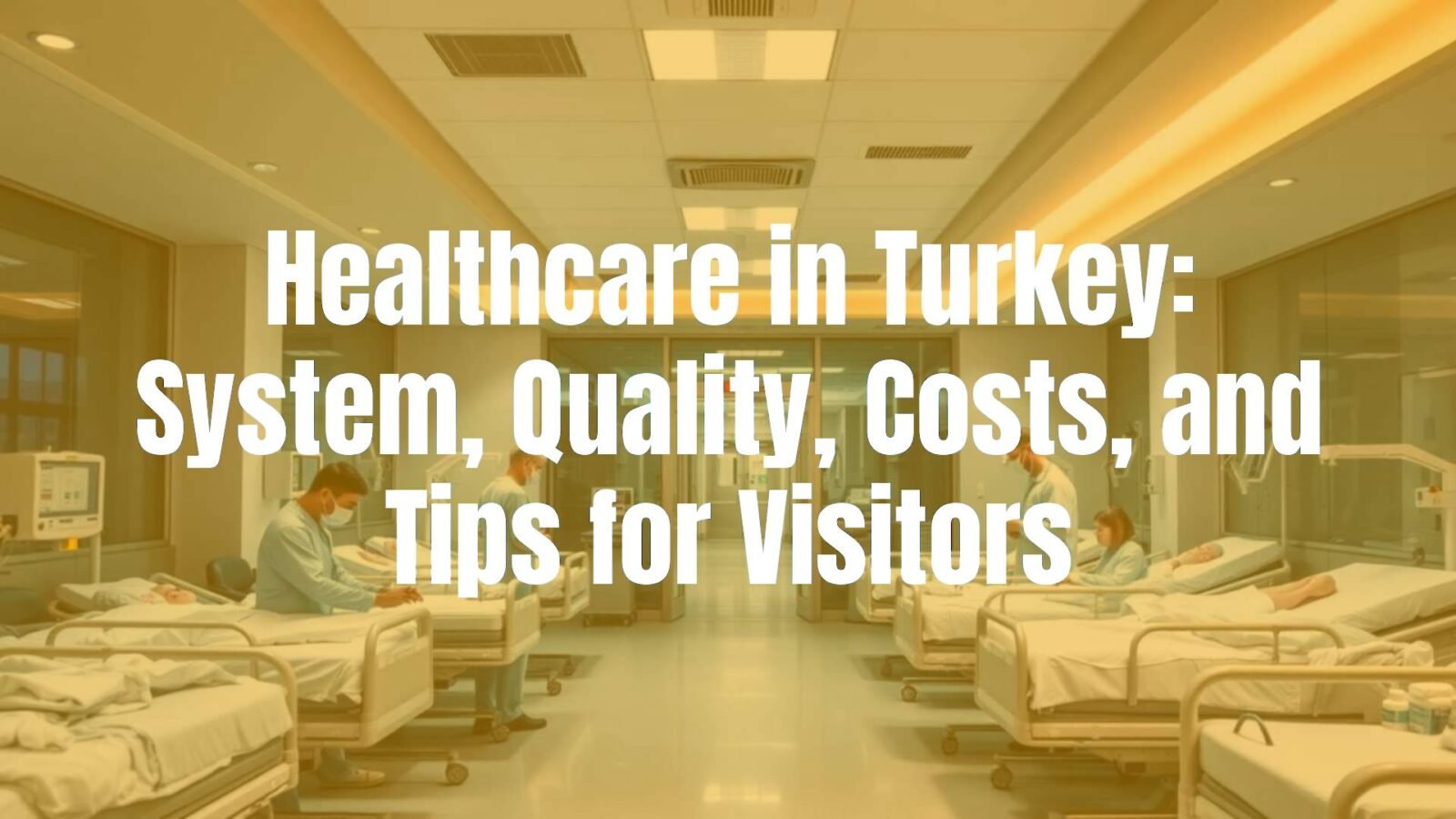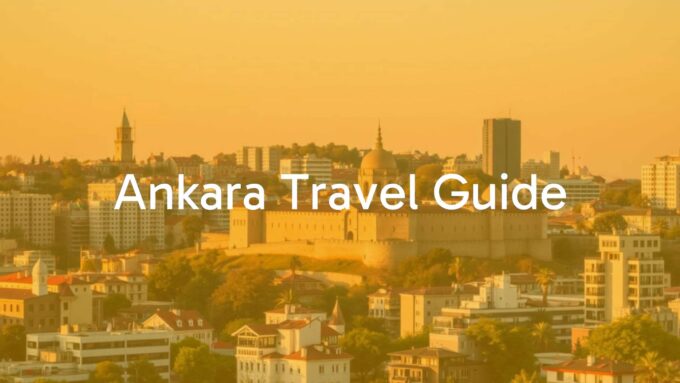Turkey sits at the crossroads of Europe and Asia, and in the last 20 years, it has changed its healthcare system into one that covers nearly everyone and meets higher standards. In 2003, Turkey introduced universal healthcare, and this was confirmed with the Universal Health Insurance Law in 2012. As a result, most people in Turkey now have access to medical care. These improvements have made people happier with their care and turned Turkey into a popular place for medical tourism. But what exactly is healthcare in Turkey like, how does it work, and what should you expect when using it?

Healthcare system in Turkey: structure and coverage
Turkey’s health system mixes public and private services, working together to help the whole population. Big changes in the early 2000s moved Turkey from government-run care to a broader, more open system. The Ministry of Health (MoH) sets health policies and is the largest provider. The Social Security Institution (SGK) handles payroll-based social security, collects money, and pays health providers.
Does Turkey have universal healthcare?
Yes. Turkey began its universal system in 2003, and by 2006, almost everyone-roughly 99%-was covered. This system is called Genel Sağlık Sigortası (Universal Health Insurance) and is mostly paid for through taxes, with a 5% extra tax on employers. Working people contribute 12.5% of their income, shared between the worker (5%) and the employer (7.5%). Pensioners who have lived in Turkey for a year get coverage, with costs paid by the state or SGK. The main goal is equal healthcare for everyone, no matter how much they earn.
What does public healthcare in Turkey cover?
The SGK runs the public healthcare system, offering wide coverage. It pays for basic, preventative, and emergency care. People can get help for workplace injuries, infectious diseases, disasters, and war-related injuries. Childbirth and fertility treatment for women under 39 are covered. Some cosmetic surgery is covered if needed for health reasons; otherwise, people must pay themselves. The SGK also pays for many tests, scans, and rehab. Dental and eye care are included by law but often not offered in public hospitals, so people may need to use private clinics and pay extra. Prescriptions are partly covered-patients pay about 20%, and retirees pay 10%. In certain cases, travel or treatment in another city or abroad may also be paid for by SGK.
How does private healthcare differ from public healthcare in Turkey?
While the public system covers a lot, private healthcare in Turkey is popular too. Private care usually means shorter waits, more modern equipment, and better facilities. Private hospitals often have staff that speak English-helpful for expats and visitors. Public hospitals can get crowded and may have fewer resources. Because of this, some people buy extra (private) insurance to help with costs that public care doesn’t cover, get faster access, or enjoy nicer facilities. Many private insurance plans work with certain hospitals and doctors. These plans help cover fees not included in public insurance, especially in private clinics.
Healthcare statistics and quality in Turkey
Turkey’s health system has gotten much better since 2003, mainly due to the Health Transformation Program (HTP). Supported by the World Bank, this program aimed to give everyone fair access to better care. The country exceeded many important health targets, and people are now more satisfied with their care.
Key numbers: hospitals, doctors, and access
| Type | Number |
|---|---|
| Public hospitals | 947 |
| Private hospitals | 572 |
| University hospitals | 68 |
| Total beds | 225,000+ |
This equals about 2.82 beds per 1,000 people, which is less than the OECD average (about 5 beds per 1,000). Large new hospitals are being built to increase capacity and update equipment.

Doctor numbers in 2016: 181 per 100,000 people (OECD average is 343). Nurse numbers: 257 per 100,000 people (OECD average is 1,098). Despite these numbers, doctors are well trained, and Turkey is adding more through 50 medical schools. Booking appointments online helps people see doctors faster.
How does Turkey’s healthcare quality compare?
Many people see Turkish healthcare as good, especially in private hospitals. In 2018, The Lancet ranked Turkey 60th out of 195 countries for healthcare. Private hospitals in Turkey often have high standards, new equipment, and skilled doctors. Patient satisfaction jumped from 39.5% in 2003 to nearly 76% in 2011. Turkey also leads Europe with about 30 JCI-accredited medical centers, showing they meet international safety and quality rules. There are more services and better care in cities than in rural areas, but Turkey’s overall quality is on the rise.
Pros and cons of healthcare in Turkey
Turkey’s healthcare system has several strong points, but there are areas that need work.
Strengths of the Turkish healthcare system
- Universal coverage: Nearly all Turkish citizens and legal residents get care, no matter how much they earn.
- Wide range of treatments: Everything from basic to advanced care-including emergencies, chronic diseases, and maternity care-is available.
- Low costs: Healthcare in Turkey is much less expensive than in the US, UK, or EU, often by 50-70%.
- Modern technology: Hospitals use digital health records and e-prescriptions. There’s a mobile app for checking health records and managing appointments.
- Modern hospitals: Recent investments have led to new, well-equipped city hospitals through partnerships between the government and private companies.

Problems and areas for improvement
- Not enough doctors: Fewer doctors per person than in many other countries. This can mean longer waits, especially in public hospitals.
- Overcrowding: Public hospitals-especially in smaller towns-can be very busy, and equipment may sometimes be old.
- Gaps in care: Rural areas may have less access to modern facilities and English-speaking doctors.
- Mental health: There is not enough funding, and most services are in large cities only.
- Gaps in insurance: Dental and eye care are theoretically covered but often not provided in public hospitals.
- Co-payments: Some payments (like for medicine) are required, and you may have to pay the full cost of dental and optical care in private clinics.
- Expats must wait a year: Foreigners need private insurance for their first year before joining public coverage.
Healthcare funding and insurance in Turkey
To use Turkey’s healthcare system, it’s important to understand who pays for it and the kinds of insurance available.
How is healthcare paid for in Turkey?
Turkey pays for healthcare mainly through taxes and required payments by workers and employers. The universal insurance (GSS) is supported by a 5% tax on employers. Employees pay 5% of their wages, and employers pay another 7.5%. Altogether, the public sector pays for about 75.2% of healthcare. People also pay for some medicines and private treatments themselves-private spending was about 15.4% in 2019. Spending on health is 6.3% of GDP, lower than the OECD average. The government has also put money into building new hospitals with private partners.
Types of health insurance in Turkey
- Universal insurance (GSS/SGK): Required for almost everyone living in Turkey. Covers most needs.
- Private insurance: For people not yet eligible for SGK-like new arrivals-or for those who want extras like private hospital care and less waiting.
- Travel insurance: Mandatory for tourists and short-term visitors, must cover at least $30,000.
Private and extra (“complementary”) health insurance
Many people buy extra health insurance to fill the gaps left by public coverage, such as faster access, English-speaking doctors, or more comfortable private clinics. These plans are offered by banks and insurance companies and can be bought directly or through brokers. Examples of providers include Allianz, Aksigorta, and Axa Sigorta.
Is health insurance needed to get care in Turkey?
Yes. Residents (after living in Turkey for one year) must have public insurance (SGK), and foreigners under 65 need insurance to get a visa. For people in Turkey less than a year, private health insurance is required. Tourists also must have travel insurance for medical costs. European Health Insurance Cards aren’t accepted. Emergency care at public hospitals is free even for those without insurance, but you’ll pay for other treatments unless you are insured.
Cost of healthcare in Turkey
Healthcare in Turkey is known for being much cheaper than in many Western countries, which is a big reason why medical tourism is growing there.
Usual costs at public and private hospitals
| Procedure | Typical Cost in Turkey (USD) | Approximate Cost in US (USD) |
|---|---|---|
| Dental implant | $1,200 | $2,400 |
| Rhinoplasty (nose surgery) | $3,000 | $6,000+ |
| Coronary bypass | $14,000 | $126,000 |
| C-section delivery | $300+ | $2,300+ |

In the public system, most care is free or involves only low payments for those with insurance. Emergency and basic care are covered. Prescriptions need a co-payment (usually 20%, 10% for retirees). In theory, dental care is included, but many use private dentists and pay the full price. Private care costs much less than in the US, UK, or EU-often half or less.
Co-payments and what’s not covered
- Prescriptions: patients usually pay a portion.
- Dental and eye care: not always available in public hospitals, so extra costs if you go private.
- Cosmetic procedures: only covered by insurance if medically needed.
- Private hospitals: even with public insurance, you may need to pay extra if you use private hospitals.
Extra (complementary) insurance helps cover these costs for people using private clinics.
How to get healthcare in Turkey: simple steps
Adjusting to a new healthcare system can be stressful, but Turkey has made the steps easier.
Who can get healthcare in Turkey?
- All Turkish citizens have public health insurance (SGK).
- Foreigners are eligible after living in Turkey for 12 months.
- Pensioners and investors with Turkish citizenship are also included, and their coverage can be extended to a spouse and children under 18.
How to register and get treated at public hospitals
- Visit your local SGK office with your passport, residency papers, address proof, and a health check from an approved doctor.
- Show you are not already covered in your home country.
- Pick a family doctor (primary care doctor).
- You must pay into SGK for 30 days before using services.
- Once approved, use the public system like a Turkish citizen.

For care, go to a local health center (“sağlık merkezi”), wait in line, or book an appointment. Use the Central Physician Appointment System (MHRS) by calling 182, their website (mhrs.gov.tr), or the mobile app. Emergency help at public hospitals is always free, but for regular care, appointments help avoid long waits.
Are public hospitals free in Turkey?
For citizens and insured residents, most care at public hospitals is free, including basic, emergency, and preventative treatment. There might be small payments for some services or medicines. For those not in the SGK system, only emergency care is free; everything else will cost money. That’s why it’s important to have proper insurance when using non-emergency services.
Pharmacies and medications in Turkey
Pharmacies (“Eczane”) are everywhere in Turkish cities and towns, and filling prescriptions is simple.
What medicines can you get and how?
- Big variety: You can get both everyday and prescribed medicine at numerous pharmacies.
- Prescriptions: Needed for many drugs, must be written by a licensed doctor.
- Electronic system: Doctors record your information in a digital health record, and send e-prescriptions to your pharmacy. The pharmacy can then get payment from the SGK for covered medicine.
Medication costs and refunds
- Medicine prices are set by law.
- The SGK pays part of most prescription costs; people usually pay 20%, retirees pay 10%.
- For medicine not covered, you pay the full price.
- Pharmacies can claim their money from the SGK for insured patients thanks to the e-prescription system.
Children’s, family, and specialty care in Turkey
Turkey gives a lot of focus to family clinics, child health, and specialist care.
Child and family healthcare
- Each neighborhood has a family health center (“sağlık merkezi”). These handle check-ups, small health problems, and prevention for everyone.
- Residents and citizens with insurance get free care here; appointments can be made online.
- For children, services cover births and regular pediatric care. Big hospitals have children’s emergency sections. This setup keeps primary care close to people’s homes.
Specialty clinics and services
- Specialist care (like for cancer, wounds, high-tech surgery, or fertility treatment) is widely available in cities, especially in private and university hospitals.
- There are clinics for dental work, advanced scans, robotic surgery, and more. Turkey is a popular place for cosmetic, dental, and eye surgeries.
- Alternative medicine (like acupuncture and homeopathy) is available in some clinics, but usually not covered by insurance.
- Mental health services are growing but mainly found in big cities.
Healthcare for expats, tourists, and non-residents
Turkey welcomes many foreigners, so it’s important to know the rules for visitors and new arrivals.
Do foreigners need health insurance?
- Yes. Anyone under 65 applying for a visa must have medical insurance.
- Tourists and visitors must have travel insurance covering $30,000+ in medical costs.
- European Health Insurance Cards aren’t accepted.
What should expats do?
- Buy private insurance for your first year in Turkey for visa and health needs.
- After one year, apply for public insurance (SGK) at your local office, bringing all the needed documents, including a health check report.
- Prove you aren’t still insured from your home country.
- Pay into SGK for at least 30 days before getting public healthcare.
- Keep private insurance if you want faster service and private hospital access.
How do tourists get help?
- Travel insurance is required and should cover at least $30,000.
- Emergency care at public hospitals is free even for those without insurance; private hospitals charge for emergencies.
- For non-emergencies, tourists pay out-of-pocket at private clinics unless insured. Costs are higher for non-residents.
Medical tourism in Turkey: benefits and things to know
Turkey has become a top spot for medical tourists, thanks to its good care and lower prices.
Why do people come to Turkey for treatment?
- Lower costs: Many procedures are around half the price of the same work in the US, UK, or EU.
- Good quality: Turkey has many JCI-accredited hospitals-about 30-meeting strict international standards.
- Modern equipment and new hospitals, especially in the private sector.
- English-speaking, skilled doctors are common in private clinics.
- Easy location: It’s easy to travel to Turkey from Europe, Asia, and Africa, and people enjoy the tourism side as well.
Most popular treatments among visitors
- Cosmetic surgery (nose surgeries, hair transplants)
- Fertility treatments (IVF, etc.)
- Dental work (like implants), often at much lower costs than abroad
- Laser eye surgery and heart surgeries
- Advanced cancer care and scans

For example, in early 2018, nearly 178,000 people traveled to Turkey for health care, mostly choosing private hospitals.
Risks and advice for medical tourists
- Language issues: Consider clinics that help international patients and offer translators.
- Make sure to have clear agreements in writing (treatment, costs, aftercare).
- Choose JCI-accredited or highly-rated hospitals for safety.
- Read up on clinics and doctors ahead of time.
- Even with Turkey’s health regulations, have strong travel insurance for added protection and any unexpected complications.
- Allow enough time for recovery before traveling home.
Frequently asked questions about healthcare in Turkey
Is Turkish healthcare good?
Most people see Turkey’s health system as good, especially after big improvements since 2003. Private hospitals in big cities are especially good, with trained doctors and modern equipment. Some public hospitals in rural areas are busy and less up to date, but city hospitals are well rated.
Is healthcare free for Turkish residents and citizens?
For those with public insurance (SGK), hospital and clinic care is mostly free. Prescription medicines may need a co-payment (usually 20% or 10% for retirees). Some treatments, like dental and optical care, might not be fully covered, meaning you might still pay privately for those.
What should visitors do to get ready for care in Turkey?
- Buy travel health insurance covering at least $30,000 for your trip.
- Bring a copy of your policy and emergency phone numbers.
- Know that European Health Insurance Cards can’t be used in Turkey.
- Public hospitals’ emergency care is free, but private care or medicine may require payment.
- It helps to learn a few Turkish words for hospitals or emergencies, even though private clinics in cities often have staff who speak English.
- The emergency number for ambulances in Turkey is 112.















Leave a comment